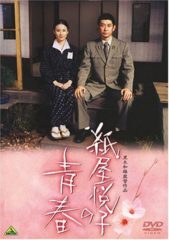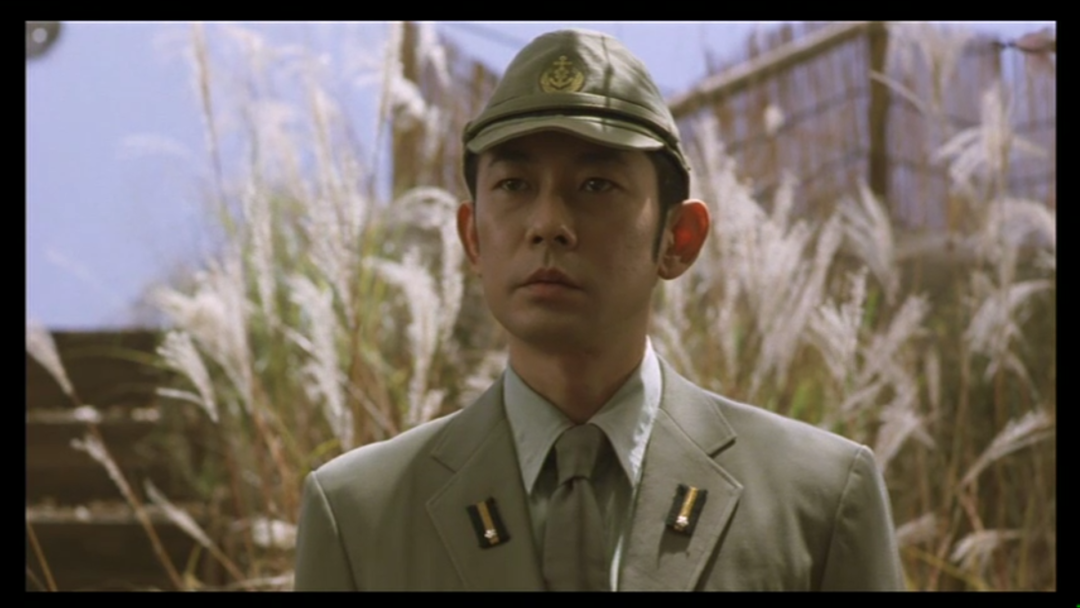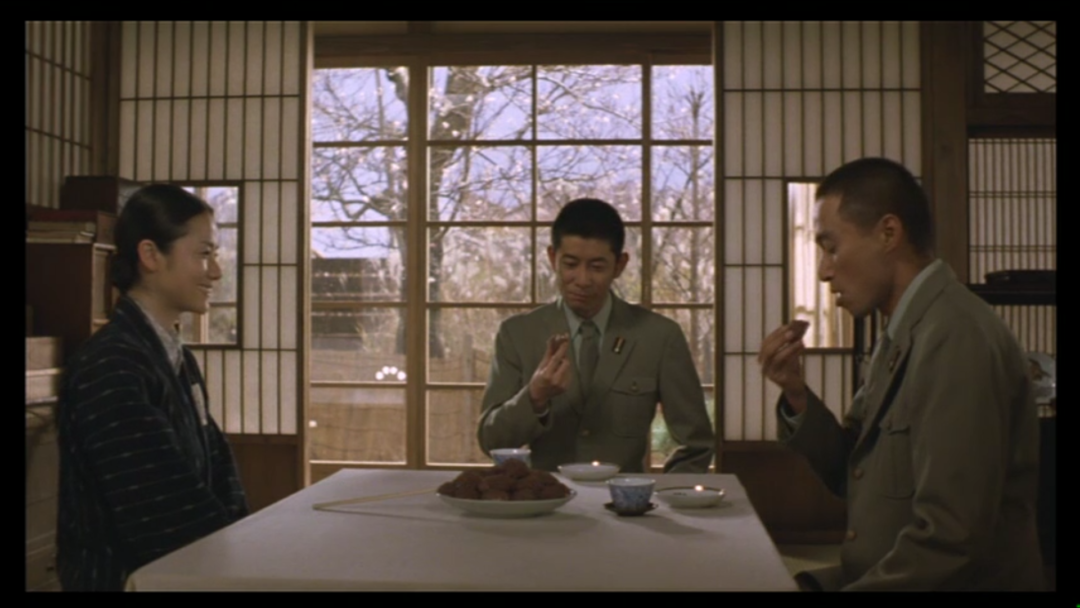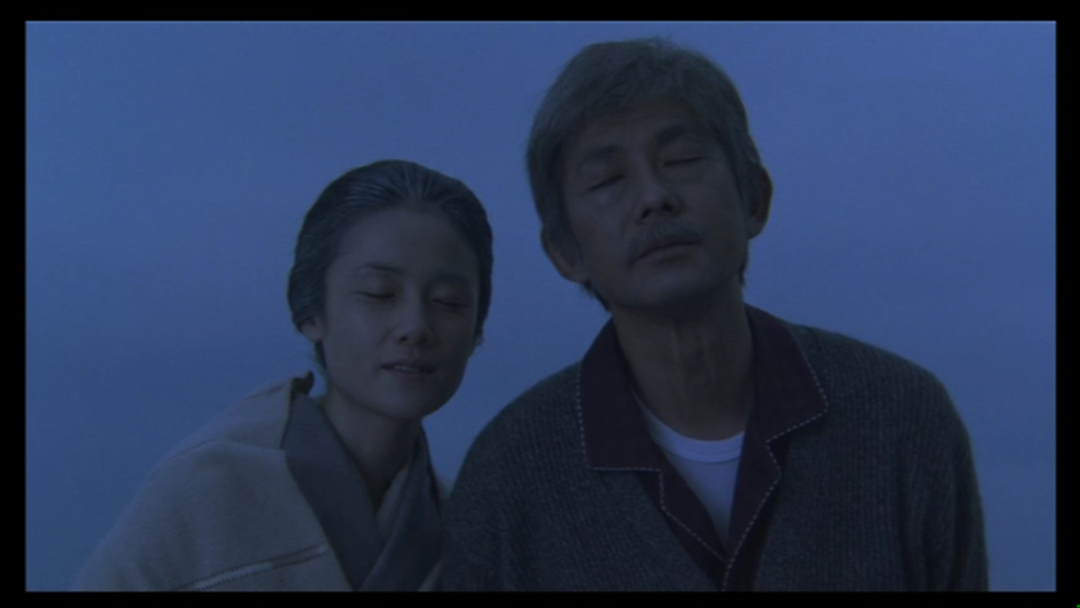REVIEW: THE BLOSSOMING OF KAMIYA ETSUKO [DVD]

Kuroki’s Final Film is Anti-War Masterpiece
Kamiya Etsuko no Seishun (紙屋悦子の青春)
Directed by Kazuo Kuroki (Kazuo Kuroki)
Japan | 111 mins
Japanese with English subtitles
Summer is not just a season of beaches and ice cream, but a time to remind ourselves of the end of the disastrous second world war. Tokyo Filmgoer recommends two works by Kazuo Kuroki, both available with English subtitles on DVD: The Face of Jiro (2004) and The Blossoming of Kamiya Etsuko (2006). Here’s our review of The Blossoming of Kamiya Etsuko.
On the dreary roof of some building, two elderly figures, presumably a husband and wife, are exchanging mundane dialogue about what time it is, whether it is chilly or not, and which direction is north. The camera moves only subtly without interrupting their poised interaction. The man is rather taciturn and nonplused, whereas his partner is warm and accepting. The mundane dialogue is about nothing at all, but eloquent enough to deliver the couple’s reciprocal understanding, and all the marital history they have been through. Cogitating on why they are still alive, they still remember “those days.”
 Following up his acclaimed War Requiem Trilogy, The Blossoming of Kamiya Etsuko (2006) is another anti-war statement by the legendary Kazuo Kuroki, a left-wing filmmaker who became known for avant-garde works for ATG. Based on a play written by Masataka Matsuda, Kuroki’s farewell masterpiece might lack cinematic excitement, but makes the most of the striking original. Intentionally understated but sentimentally driven, this peaceful war movie deserves more than domestic applause with its emotional turmoil delivered in a restrained manner.
Following up his acclaimed War Requiem Trilogy, The Blossoming of Kamiya Etsuko (2006) is another anti-war statement by the legendary Kazuo Kuroki, a left-wing filmmaker who became known for avant-garde works for ATG. Based on a play written by Masataka Matsuda, Kuroki’s farewell masterpiece might lack cinematic excitement, but makes the most of the striking original. Intentionally understated but sentimentally driven, this peaceful war movie deserves more than domestic applause with its emotional turmoil delivered in a restrained manner.
The setting moves from the roof to the town of Komenotsu, Kagoshima in spring 1945. The main plot of The Blossoming starts with an Ozu-like trajectory: a marriage proposal for Etsuko (Tomoyo Harada), an orphan who has grown up with an older brother, Yasutada (Kaoru Kobayashi). In Etsuko’s absence, Yasutada informs his wife, Fusa (Manami Honjo), of the proposal, which matches Etsuko with Second Lieutenant Nagayo from the Naval Aviation Corps. Learning that the proposal was suggested by Second Lieutenant Akashi, Fumi whispers Etsuko’s hidden but strong affection toward Lt. Akashi, into Yasutada’s ignorant ear. Coming back home at just the right moment, Etsuko agrees to a meeting the next day, while Yasutada and Fumi are away on business.
At 1:00 p.m., two soldiers arrive at Etsuko’s empty house. Waiting for the owner’s return, they start comically chatting about how to impress a woman. One soldier is scowling and milquetoast, while another is decent and shrewd. Here, spectators learn that the milquetoast is Lt. Nagayo (Masatoshi Nagase), who is reminiscent of the elderly man on the roof: an intentional spoiler that Etsuko could not marry Lt. Akashi (Shunsuke Matsuoka). However, this lovely sequence is free from a disquieting atmosphere, with Lt. Nagayo attempting to brag of his ability to create “a heater out of a lunchbox.”
 Misunderstanding that the meeting was to take place at 3:00 p.m., Etsuko comes back and is flabbergasted at the soldiers’ presence. As a pilot who will soon be recruited for a kamikaze attack, Lt. Akashi leaves the two potential lovebirds alone, avoiding any kind of romantic turn with Etsuko, and hoping Lt. Nagayo will take good care of her. With some awkward silence and overtly nervous interactions, spectators can witness the inception of a charming couple, even though the audience and the other characters, including Lt. Nagayo, are cogniscent of Etsuko’s real passion, which belongs to the kamikaze pilot.
Misunderstanding that the meeting was to take place at 3:00 p.m., Etsuko comes back and is flabbergasted at the soldiers’ presence. As a pilot who will soon be recruited for a kamikaze attack, Lt. Akashi leaves the two potential lovebirds alone, avoiding any kind of romantic turn with Etsuko, and hoping Lt. Nagayo will take good care of her. With some awkward silence and overtly nervous interactions, spectators can witness the inception of a charming couple, even though the audience and the other characters, including Lt. Nagayo, are cogniscent of Etsuko’s real passion, which belongs to the kamikaze pilot.
Based on the theatre script, Kuroki’s direction is so uncomplicated that the film is not dependent on the filmic medium; in many scenes, Kuroki employs long takes with long shots as if the director hopes not to destroy the theatrical setting. However, this minimal camerawork is so captivating, focusing on the subtle emotional expressions of the actors. While Harada’s performance is alluring, implying every emotion of the idealized Japanese woman who does not reveal her true feelings, Honjo is a real scene-stealer who cannot help openly advocating her hatred toward war.
Although Shochiku had nothing to do with the production of The Blossoming, the charm of the film seems to be indebted to Ofuna-cho, emotionally narrating the drama of a private household to present the era’s severe social conditions. As the beauty of cherry blossoms outside the house represents, the prime of life is too short and fragile, especially under the detestable circumstances of war. However, as with Ofuna-cho films, The Blossoming ends on a rather positive note. Etsuko insists that, though logically impossible, she heard the sound of the ocean after the meeting with her future husband. Under the contemporary fashion of nationalism, do we hear the same sound of the ocean?
By Kenta Kato
・THE BLOSSOMING OF KAMIYA ETSUKO [DVD]
Kenta Kato is a Tokyo-based writer, film critic and festival programmer, currently working on a Master’s degree in Film Studies at Waseda University.
・字幕: 日本語, 英語 means subtitles with Japanese and English,
・英語字幕版 means with English subtitles.


![・THE BLOSSOMING OF KAMIYA ETSUKO [DVD]](http://kismetjapan.jp/tokyofilmgoer/wp-content/uploads/2016/08/kamiya_etsuko.jpg)